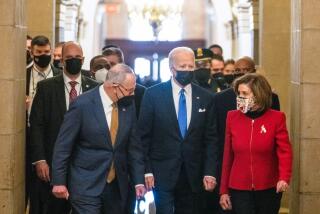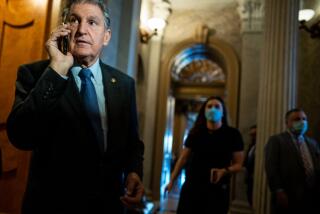White House Admits Agenda Is in Trouble
- Share via
WASHINGTON — The White House, shaken by Budget Director Leon E. Panetta’s bleak public assessment of President Clinton’s congressional agenda, conceded Tuesday that major Administration proposals are in deep trouble on Capitol Hill.
And, although Clinton aides and Democratic congressional leaders insisted that the President can still achieve his most important goals, many conceded privately that Panetta’s blunt comments reflect an underlying problem of conflicting priorities, confusion and disarray within the Administration that threatens to return gridlock to the nation’s capital.
The budget director’s remarks, which also rocked Capitol Hill, were extraordinarily critical for a Cabinet member and provided dramatic evidence that the Administration’s problems run far deeper than had been suspected, even in the aftermath of Senate Republicans’ humbling defeat of Clinton’s $16.3-billion economic stimulus package.
Moreover, inside the Administration there is little agreement yet on a concrete strategy for rectifying the situation.
Among other problems, a serious division exists between Panetta and other members of the President’s economic team and the health care task force. The division centers on whether the highly controversial--and expensive--health care program should be pushed now or held back until the economic plan has cleared Congress.
Panetta had voiced his gloomy analysis of Clinton’s agenda within the Administration for some time before finally deciding to go public with it in a luncheon session with reporters Monday. News of it dominated political talk in Washington Tuesday.
The headlines in morning newspapers initially shocked and angered Clinton. But aides said the President cooled down after Panetta explained that he was only trying to give an honest assessment but did not mean to leave the impression that the congressional battles could not be won.
Later, White House aides tried to play down the significance of the budget director’s comments. During an afternoon photo session, Clinton told reporters that Panetta had done “a wonderful job” for the Administration, and he had only had “a bad day yesterday because his spirits were down.”
White House Communications Director George Stephanopoulos said Tuesday that Panetta was “just giving his assessment of where we are” but that “we’re realistic about the challenges we face. . . . We’re also determined to face them down and to succeed.”
However, the thrust of the Panetta analysis--that virtually all of Clinton’s major programs are in danger and could go down to defeat if he fails to focus on them and sell them to the public--is widely shared within the Administration and among Democrats in Congress.
As things stand, Panetta told reporters Monday, Congress would reject the Russian aid package (the White House said Tuesday that it plans to delay requests for additional Russian aid) and the North American Free Trade Agreement. And, he said, only by aggressively fighting could Clinton salvage his major goals of economic growth and health care reform. Moreover, he said, Clinton’s job-stimulating investment tax credit is in serious trouble and may be scaled back, and his proposed energy tax faces “a very tough battle” and could wind up being defeated.
The President, Panetta said, needs to “do a better job of picking and choosing the battles he wants to go through” if he wants to avoid defeats like that of his economic stimulus package last week.
Panetta suggested that Clinton should delay submitting the health care package until after work is completed some time this summer on the massive budget “reconciliation” bill, which is central to the President’s long-term economic agenda and calls for reducing the budget deficit by $519 billion over five years through tax increases and spending cuts.
Although other Democrats, including House Speaker Thomas S. Foley (D-Wash.), also have suggested that the health care plan should be delayed, Stephanopoulos said that Clinton intends to stick to his plan to unveil it next month.
While most Democrats were reluctant to criticize Clinton, Panetta’s remarks underscored the growing frustration of some Democratic senators with the way Clinton is trying to push his crowded legislative agenda through Congress.
“Hallelujah!” exclaimed Sen. Bob Kerrey (D-Neb.). “Leon Panetta is right. . . . You cannot have 10 or 15 things that you’re trying to push at the same time, because the American people can’t keep that kind of focus.”
Kerrey said that the Administration needs to concentrate on two or three priorities and postpone the rest of the agenda, including health care, until they are passed. “Priority No. 1 has to be deficit reduction. We as Democrats cannot continue to make caricatures of ourselves by opposing whatever spending cuts are out there.”
Not all Democrats agreed with Panetta’s assessment, of course, and some tried to put the best face on it, agreeing with Clinton that the former California congressman was just having a bad day when he talked to reporters.
“I’m much more optimistic than Leon Panetta. . . . I think Leon was just in a down mood,” said Sen. Paul Simon (D-Ill.).
Sen. Tom Harkin (D-Iowa) called Panetta “one of the sweetest guys I’ve ever known,” but said that his remarks do not “seem much like team spirit to me.”
Sen. John D. (Jay) Rockefeller IV (D-W.Va.), a longtime health care advocate who was obviously annoyed at Panetta’s remarks, predicted that health care legislation would pass this year and that any senator who votes against it or attempts to postpone it until next year “is sowing the seeds of his political death.”
Another health care advocate, Sen. Edward M. Kennedy (D-Mass.), dismissed Panetta’s remarks as an inside-the-Beltway phenomenon but said that a group of Democratic senators recently advised the President to get a little rest, adding: “I think he’s trying to do everything.”
Both Senate Majority Leader George J. Mitchell (D-Me.) and Foley also differed with Panetta’s appraisal of the Clinton legislative agenda, although they praised the budget director’s abilities.
Two Administration officials--U.S. Trade Representative Mickey Kantor and Commerce Secretary Ronald H. Brown--specifically took issue with Panetta’s assertion that the North American Free Trade Agreement is in deep trouble.
Kantor said that the agreement would gain support when supplemental agreements intended to protect workers and the environment are negotiated. “We still intend to meet the goal of a Jan. 1, 1994, implementation,” Kantor said. Added Brown: “Neither our position nor that of the Administration has changed.”
Nevertheless, some senior Administration officials said they share concern that Clinton has allowed his focus to shift away from economic policy toward other issues, especially health care. In off-the-record interviews, they said that Panetta’s fundamental concern is that the process of developing the health care reform package is being allowed to overshadow the need to keep the President’s focus on the congressional battle over the budget “reconciliation” bill.
The long-term economic plan unveiled with so much fanfare in February now faces severe problems on Capitol Hill in the wake of the Republicans’ defeat of Clinton’s economic stimulus package. But the President’s attention has been diverted both by foreign policy concerns and by the push to complete a health care package by mid- to late May.
“Those of us who are most concerned about the economic plan are worried that the health plan might derail the economic plan, especially on Capitol Hill,” said one senior Administration economic policy official. “The economic team is concerned about this health plan. We’d be crazy if we weren’t.”
Panetta and other senior economic officials also reportedly are frustrated at the complex and arcane decision-making process used by the White House health care task force under First Lady Hillary Rodham Clinton. They have complained that the process is so Byzantine it is difficult to get straight answers about how much the program will cost.
With only about three weeks left before the scheduled release of the health care plan, the President still has not made any decisions on how to pay for it. Part of the problem, according to some officials, is that the President himself is pushing in internal meetings for fast action on the program.
Panetta declined to be interviewed Tuesday. But Barry Toiv, a spokesman in his office, said that the budget director’s analysis had not been aimed at sending a message to Clinton that he had better reorder his priorities or suffer more defeats in Congress.
Toiv said that Panetta simply had tried to give an honest assessment of the Administration’s challenges on Capitol Hill but had not realized that it would create such an uproar.
At a White House photo session, Clinton laughed off a question about whether he would have to take Panetta “to the woodshed.”
Panetta, Clinton said, has “a lot of credibility, and I think every member of Congress that’s ever worked with Leon Panetta would say he’s one of the most honest, competent people they’ve ever worked with. He had a bad day yesterday because he got his spirits down. I want to buck him up. I don’t want to take him to the woodshed.”
Times staff writers William J. Eaton, James Gerstenzang, James Risen and Michael Ross contributed to this story.
More to Read
Get the L.A. Times Politics newsletter
Deeply reported insights into legislation, politics and policy from Sacramento, Washington and beyond. In your inbox twice per week.
You may occasionally receive promotional content from the Los Angeles Times.










